The Earth Bible Commentary series provides ecological readings of biblical texts, focusing on some of the core issues facing the world today. The writers accentuate issues in the original texts that relate specifically to the care of our global environment, and the interaction between religion and ecology. The volumes read the bible from the perspective of the Earth and consider how the Earth can be presented as sacred.
eBooks of this series are available on the Library Hub.
To find relevant resources on the Library Hub, select the Subject search on the Advanced Search of the catalogue. For this particular subject, here are some relevant search terms to get you started:
In the catalogue, be sure to use the filters on the left to refine your search results.

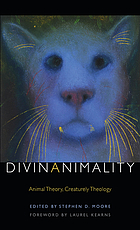 Divinanimality
by
Stephen Moore (Editor); Laurel Kearns
A turn to the animal is underway in the humanities, most obviously in such fields as philosophy, literary studies, cultural studies, and religious studies. One important catalyst for this development has been the remarkable body of animal theory issuing from such thinkers as Jacques Derrida and Donna Haraway. What might the resulting interdisciplinary field, commonly termed animality studies, mean for theology, biblical studies, and other cognate disciplines? Is it possible to move from animal theory to creaturely theology? This volume is the first full-length attempt to grapple centrally with these questions. It attempts to triangulate philosophical and theoretical reflections on animality and humanity with theological reflections on divinity. If the animal human distinction is being rethought and retheorized as never before, then the animal human divine distinctions need to be rethought, retheorized, and retheologized along with it. This is the task that the multidisciplinary team of theologians, biblical scholars, philosophers, and historians assembled in this volume collectively undertakes. They do so frequently with recourse to Derrida's animal philosophy and also with recourse to an eclectic range of other relevant thinkers, such as Haraway, Giorgio Agamben, Emmanuel Levinas, Gloria Anzaldua, Helene Cixous, A. N. Whitehead, and Lynn White Jr. The result is a volume that will be essential reading for religious studies audiences interested in ecological issues, animality studies, and posthumanism, as well as for animality studies audiences interested in how constructions of the divine have informed constructions of the nonhuman animal through history.
Divinanimality
by
Stephen Moore (Editor); Laurel Kearns
A turn to the animal is underway in the humanities, most obviously in such fields as philosophy, literary studies, cultural studies, and religious studies. One important catalyst for this development has been the remarkable body of animal theory issuing from such thinkers as Jacques Derrida and Donna Haraway. What might the resulting interdisciplinary field, commonly termed animality studies, mean for theology, biblical studies, and other cognate disciplines? Is it possible to move from animal theory to creaturely theology? This volume is the first full-length attempt to grapple centrally with these questions. It attempts to triangulate philosophical and theoretical reflections on animality and humanity with theological reflections on divinity. If the animal human distinction is being rethought and retheorized as never before, then the animal human divine distinctions need to be rethought, retheorized, and retheologized along with it. This is the task that the multidisciplinary team of theologians, biblical scholars, philosophers, and historians assembled in this volume collectively undertakes. They do so frequently with recourse to Derrida's animal philosophy and also with recourse to an eclectic range of other relevant thinkers, such as Haraway, Giorgio Agamben, Emmanuel Levinas, Gloria Anzaldua, Helene Cixous, A. N. Whitehead, and Lynn White Jr. The result is a volume that will be essential reading for religious studies audiences interested in ecological issues, animality studies, and posthumanism, as well as for animality studies audiences interested in how constructions of the divine have informed constructions of the nonhuman animal through history.
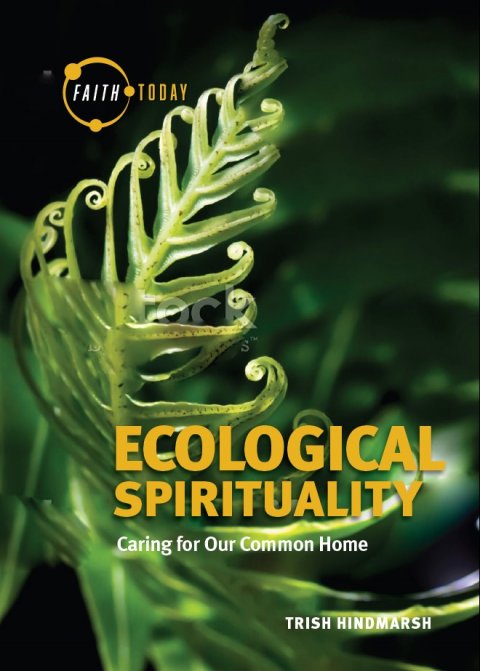 Ecological spirituality: caring for our common home
by
Trish Hindmarsh
What are the links between spirituality and the evolution of the cosmos during the past almost 15 billion years? How does a sense of the sacred inspire and influence our relationship with the natural world? How can a spiritual life guide us in responding to the ecological crisis we face now as humans? In some religious contexts aspiring to be 'green' is associated with secularism and left-leaning politics. Not for medieval saints Francis of Assisi and Hildegard of Bingen! Trish Hindmarsh explores what it means to be 'spiritual' and discusses the opportunities to discern what decisions and actions are needed right now to live out an ecological spirituality, responding wholeheartedly to this most serious 'sign of our times', and dreaming a better future for our children.
Ecological spirituality: caring for our common home
by
Trish Hindmarsh
What are the links between spirituality and the evolution of the cosmos during the past almost 15 billion years? How does a sense of the sacred inspire and influence our relationship with the natural world? How can a spiritual life guide us in responding to the ecological crisis we face now as humans? In some religious contexts aspiring to be 'green' is associated with secularism and left-leaning politics. Not for medieval saints Francis of Assisi and Hildegard of Bingen! Trish Hindmarsh explores what it means to be 'spiritual' and discusses the opportunities to discern what decisions and actions are needed right now to live out an ecological spirituality, responding wholeheartedly to this most serious 'sign of our times', and dreaming a better future for our children.
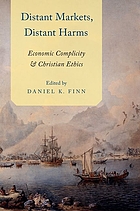 Distant markets, distant harms : economic complicity and Christian ethics
by
Daniel K Finn
This title looks at moral complicity in markets, employing resources from sociology, early Christian history, feminism, legal theory, and Catholic moral theology today. The authors explore the causal and moral responsibilities which consumers bear for the harms that markets cause to distant others.Does a consumer who bought a shirt made in another nation bear any moral responsibility when the women who sewed that shirt die in a factory fire or in the collapse of the building? Many have asserted, without explanation, that because markets cause harms to distant others, consumers bear moral responsibility for those harms. But traditional moral analysis of individual decisions is unable to sustain this argument. Distant Harms, Distant Markets presents a careful analysis of moral complicity in markets, employing resources from sociology, Christian history, feminism, legal theory, and Catholic moral theology today. Because of its individualistic methods, mainstream economics as a discipline is not equipped to understand the causality entailed in the long chains of social relationships that make up the market. Critical realist sociology, however, has addressed the character and functioning of social structures, an analysis that can helpfully be applied to the market. The True Wealth of Nations research project of the Institute for Advanced Catholic Studies brought together an international group of sociologists, economists, moral theologians, and others to describe these causal relationships and articulate how Catholic social thought can use these insights to more fully address issues of economic ethics in the twenty-first century. The result was this interdisciplinary volume of essays, which explores the causal and moral responsibilities that consumers bear for the harms that markets cause to distant others.
Distant markets, distant harms : economic complicity and Christian ethics
by
Daniel K Finn
This title looks at moral complicity in markets, employing resources from sociology, early Christian history, feminism, legal theory, and Catholic moral theology today. The authors explore the causal and moral responsibilities which consumers bear for the harms that markets cause to distant others.Does a consumer who bought a shirt made in another nation bear any moral responsibility when the women who sewed that shirt die in a factory fire or in the collapse of the building? Many have asserted, without explanation, that because markets cause harms to distant others, consumers bear moral responsibility for those harms. But traditional moral analysis of individual decisions is unable to sustain this argument. Distant Harms, Distant Markets presents a careful analysis of moral complicity in markets, employing resources from sociology, Christian history, feminism, legal theory, and Catholic moral theology today. Because of its individualistic methods, mainstream economics as a discipline is not equipped to understand the causality entailed in the long chains of social relationships that make up the market. Critical realist sociology, however, has addressed the character and functioning of social structures, an analysis that can helpfully be applied to the market. The True Wealth of Nations research project of the Institute for Advanced Catholic Studies brought together an international group of sociologists, economists, moral theologians, and others to describe these causal relationships and articulate how Catholic social thought can use these insights to more fully address issues of economic ethics in the twenty-first century. The result was this interdisciplinary volume of essays, which explores the causal and moral responsibilities that consumers bear for the harms that markets cause to distant others.
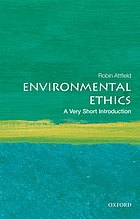 Environmental ethics : a very short introduction
by
Robin Attfield
Environmental ethics is a relatively new branch of philosophy, which studies the values and principles involved in combatting environmental problems such as pollution, loss of species and habitats, and climate change. As our environment faces evermore threats from human activities these core issues are becoming increasingly important. In this work, Robin Attfield traces the origins of environmental ethics as a discipline, and considers how it defends the independent value of living creatures, and the need to make decisions informed by the needs and interests of future generations. Exploring the diverse approaches to ethical decisions and judgements, he highlights the importance of making processes of production and consumption sustainable and of addressing human population levels, together with policies for preserving species, sub-species, and their habitats.
Environmental ethics : a very short introduction
by
Robin Attfield
Environmental ethics is a relatively new branch of philosophy, which studies the values and principles involved in combatting environmental problems such as pollution, loss of species and habitats, and climate change. As our environment faces evermore threats from human activities these core issues are becoming increasingly important. In this work, Robin Attfield traces the origins of environmental ethics as a discipline, and considers how it defends the independent value of living creatures, and the need to make decisions informed by the needs and interests of future generations. Exploring the diverse approaches to ethical decisions and judgements, he highlights the importance of making processes of production and consumption sustainable and of addressing human population levels, together with policies for preserving species, sub-species, and their habitats.
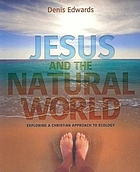 Jesus and the natural world : exploring a christian approach to ecology
by
Denis Edwards 1943-Geraldine Corridon
Jesus and the natural world : exploring a christian approach to ecology
by
Denis Edwards 1943-Geraldine Corridon
 The Promise of Nature
by
John F. Haught
While justifying the role of religion in shaping an ecological ethic, the author explores the religious and specifically Christian reasons why we should care for the natural world.
The Promise of Nature
by
John F. Haught
While justifying the role of religion in shaping an ecological ethic, the author explores the religious and specifically Christian reasons why we should care for the natural world.
 The city and global development : beyond the North-South paradigm
by
Linda Hogan, Alina Krause, Markus Büker
Part One Humanity on the move. The century of cities: pathways towards sustainability / Dirk Messner -- Part Two Theological reflections on urbanisation and its challenges. Christians as troublemakers in the city: initial experiences and visions on the value of Christian faith for shaping society / Martin Ebner -- Learning to live a life of hospitality: theological foundations for proclaiming the faith in the cultural plurality of big cities / Margit Eckholt -- Transforming our cities: public role of faith and theology / Felix Wilfred -- Part Three Ethical reflections on urbanisation and its challenges. Cities and their global responsibility: reflections on social ethics from a German perspective / Michelle Becka -- Faith and religion in globalized megacities: a view from Manila / Daniel Franklin Pilario -- Globalisation, urbanisation, and the common good / Linda Hogan -- Part Four The praxis of creating humane spaces. Liberating urban development and the South African church: a critical reflection in conversation with David Korten and Gustavo Gutierrez / Stephan De Beer -- The contribution of civil society organisations to transformation: consequences for the work of NGOs - Misereor / Georg Stoll -- Living with dignity and peace: social mobilization for housing rights and the right to the city / Lorena Zárate -- The third paradise / Marco Kusumawijaya -- The periphery in the centre / Luiz Kohara -- Part Five Theological forum. The death penalty, church teaching and the development of dogma: reflections on Pope Francis' change to the Catechism / Michael Seewald.
The city and global development : beyond the North-South paradigm
by
Linda Hogan, Alina Krause, Markus Büker
Part One Humanity on the move. The century of cities: pathways towards sustainability / Dirk Messner -- Part Two Theological reflections on urbanisation and its challenges. Christians as troublemakers in the city: initial experiences and visions on the value of Christian faith for shaping society / Martin Ebner -- Learning to live a life of hospitality: theological foundations for proclaiming the faith in the cultural plurality of big cities / Margit Eckholt -- Transforming our cities: public role of faith and theology / Felix Wilfred -- Part Three Ethical reflections on urbanisation and its challenges. Cities and their global responsibility: reflections on social ethics from a German perspective / Michelle Becka -- Faith and religion in globalized megacities: a view from Manila / Daniel Franklin Pilario -- Globalisation, urbanisation, and the common good / Linda Hogan -- Part Four The praxis of creating humane spaces. Liberating urban development and the South African church: a critical reflection in conversation with David Korten and Gustavo Gutierrez / Stephan De Beer -- The contribution of civil society organisations to transformation: consequences for the work of NGOs - Misereor / Georg Stoll -- Living with dignity and peace: social mobilization for housing rights and the right to the city / Lorena Zárate -- The third paradise / Marco Kusumawijaya -- The periphery in the centre / Luiz Kohara -- Part Five Theological forum. The death penalty, church teaching and the development of dogma: reflections on Pope Francis' change to the Catechism / Michael Seewald.
 Environmental stewardship in the Judeo-Christian tradition implications for Christian living in the 21st century
by
Marianne PostiglioneThomas P SheahenInstitute for Theological Encounter with Science and Technology.
Porceedings of the ITEST Conference, October 2009.
Environmental stewardship in the Judeo-Christian tradition implications for Christian living in the 21st century
by
Marianne PostiglioneThomas P SheahenInstitute for Theological Encounter with Science and Technology.
Porceedings of the ITEST Conference, October 2009.